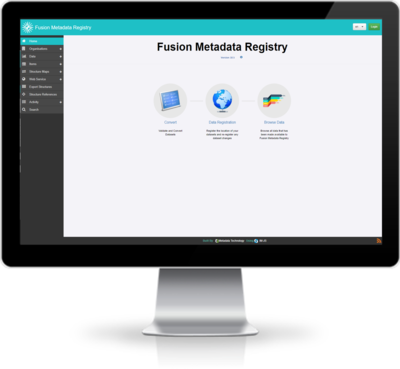Difference between revisions of "Main Page"
Jump to navigation
Jump to search
(→SDMX 2.1 Theory) |
(→Key Features) |
||
| Line 33: | Line 33: | ||
::[[File:FMR1.png|400px]] | ::[[File:FMR1.png|400px]] | ||
===Key Features=== | ===Key Features=== | ||
| − | * SDMX structural | + | * SDMX structural metadata registry compliant with the SDMX 2.1 specification |
* Formats: SDMX-EDI, SDMX-ML 1.0, 2.0, 2.1, SDMX-JSON | * Formats: SDMX-EDI, SDMX-ML 1.0, 2.0, 2.1, SDMX-JSON | ||
* SDMX REST structure API | * SDMX REST structure API | ||
Revision as of 00:37, 25 September 2020
Fusion Metadata Registry (FMR) Knowledge Base
Topics
Using Fusion Metadata Registry
| Quick Start Guide | Install and configure a basic FMR installation |
| How to Guides | Guidance on specific tasks using FMR |
| Configuration Reference | Configuring FMR |
| Structural Metadata Management | Creating and maintaining SDMX structures using the FMR web user interface |
SDMX 2.1 Theory
| Concepts Reference | Explanation of key concepts and terms used in SDMX |
| Structures Reference | Details on each of the key maintainable SDMX structures |
| Formats Reference | Details on each of the data and structure formats available in Fusion Metadata Registry including XML, JSON and CSV |
| REST API Web Services Reference | Purpose, parameters, request content and response content for each of the published web services together with examples |
About Fusion Metadata Registry
Fusion Metadata Registry 10 implements the SDMX 2.1 specification for a structural metadata registry.
Key Features
- SDMX structural metadata registry compliant with the SDMX 2.1 specification
- Formats: SDMX-EDI, SDMX-ML 1.0, 2.0, 2.1, SDMX-JSON
- SDMX REST structure API
- Web user interface for browsing, authoring and maintaining structures
- Validator for checking that SDMX data complies with the structural metadata
- Transformer for executing SDMX Structure Maps
Use Cases
- Repository for SDMX structural metadata
- Interactively authoring and maintaining SDMX structures using the web user interface
- SDMX structural metadata REST API service
- Data validation - validate that data complies with SDMX structures
- Data transformation - transform data into different structures and coding schemes using SDMX Structure Mapping
- Data conversion - convert data between SDMX versions and formats
